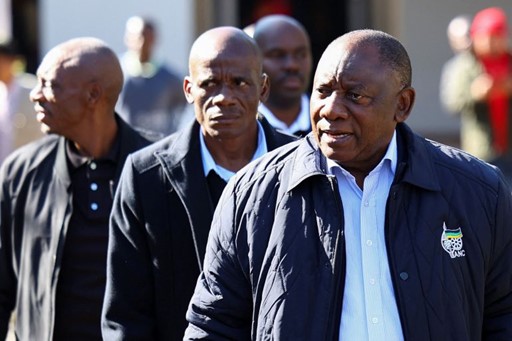President Cyril Ramaphosa may not be thinking straight. The president is hoping to form a government of National Unity with all major political parties with seats in parliament. The problem is many of these parties have such differing views that a consensus would be impossible for them to agree upon. Ramaphosa has made it clear that the African National Congress (ANC) party will seek a National Unity Government, which he said will reflect the will of voters and help move the country forward.
Ramaphosa made the announcement late on Thursday after an hours-long meeting of the party’s National Executive Committee (NEC) in Johannesburg, where ANC leaders held talks to try to agree on a post-election strategy. The ANC had lost its parliamentary majority for the first in the democratic era, but it remains the largest party in the country. “We agreed to invite political parties to form a government of national unity as the best option to move the country forward,” Ramaphosa told reporters. “The purpose of the government of national unity must be first and foremost to tackle the pressing issues that South Africans want to be addressed.”(Al Jazeera)
The president is trying to keep the ANC’s options open, but a national unity government would require all the political parties to cooperate. This would be complexed given the radically different political views and ideas concerning government policy among the parties. None the less the ANC is still the party with the most seats in parliament if not an outright majority. With only 159 seats below the over two hundred in the National Assembly. It is going to be hard enough to elect the speaker of the National Assembly if the relevant parties can reach a consensus. Forming an inclusive government will have to include ideologically opposed rivals that do not see eye to eye.
He (Ramaphosa) called for the “broadest unity” among South Africans to tackle the country’s issues including crime, poverty, high cost of living and corruption. “This moment also calls for multiparty cooperation and multi- stakeholder collaboration if we are to overcome the severe challenges that confront our country,” Ramaphosa said. He added that the ANC heard the people of South Africa and recognised their “frustration” voiced during the May 29 vote. The former liberation movement has run South Africa since it swept to power with Nelson Mandela at the helm in the 1994 election that marked the end of apartheid. But it was punished for its chequered history in last week’s election. While still the largest party, the ANC can no longer govern alone. “This is a time for sober minds,” ANC Secretary-General Fikile Mbalula said earlier on Thursday. “We’re looking at all options.”(Al Jazeera)
Ramaphosa has acknowledged the “frustration” of the South African people but it may be too late. Ramaphosa had five years to rectify the damage done by former President Jacob Zuma his predecessor turned leader of the Umkhonto We Sizwe (MK) party. Although it may be said that exterior factors such as the Covid 19 and the War in Ukraine had its impact on the economic landscape, Ramaphosa failed to show decisive actions at time to improve South Africa’s fortunes. Has the president learned from his mistakes? The idea of the Economic Freedom Fighters (EFF), MK and the Democratic Alliance (DA) being in the same cabinet does not sound like a plausible reality. The MK is a largely unknown entity and Zuma’s real agenda behind its creation is not known. Ramaphosa is stuck in a quagmire from which he cannot emerge. The disgraced former president Zuma clearly wants a presidential pardon.
How he receives it? Is the question. Ramaphosa for his part went on to say:
“The purpose of the government of national unity must be, first and foremost, to tackle the pressing issue that South Africans want to be addressed,” Ramaphosa said late on Thursday after a marathon ANC meeting. “These issues include job creation and the growth of our economy that will be inclusive, the high cost of living, service delivery, crime and corruption,” he said. In last week’s general election, the ANC won just over 40% of the vote and 158 seats in South Africa’s National Assembly, falling short of an outright majority for the first time. As Ramaphosa acknowledged after 10 hours of intensive talks with his party’s senior members at a Johannesburg conference centre, the governing party now needs partners to form a government.(The Guardian)
The ANC is facing an uphill battle to find those coalition partners. They can talk with the other parties in parliament to join hands in forming a cabinet but everyone has a different agenda. The EFF and the MK will do everything in their power to at least undermine, Ramaphosa and see him resign. For the president at least it will be like drinking from a poisoned chalice to form a government with these parties. Not even the DA is not so bitter to the president, although their goals and agendas are not quite known apart from improving the police. The EFF wants to shift the government to the far left and nationalize the mines and the Reserve Bank and seize land without giving compensation.
MK being a new party in the arena remains a largely unknown entity, but their core support is KwaZulu-Natal. Now it will depend on Ramaphosa to thread the murky waters of negotiation with these political parties and reaching a consensus. It will be like finding a needle in a hay stack.
Article written by:
Yacoob Cassim
Journalist at Radio Al Ansaar






